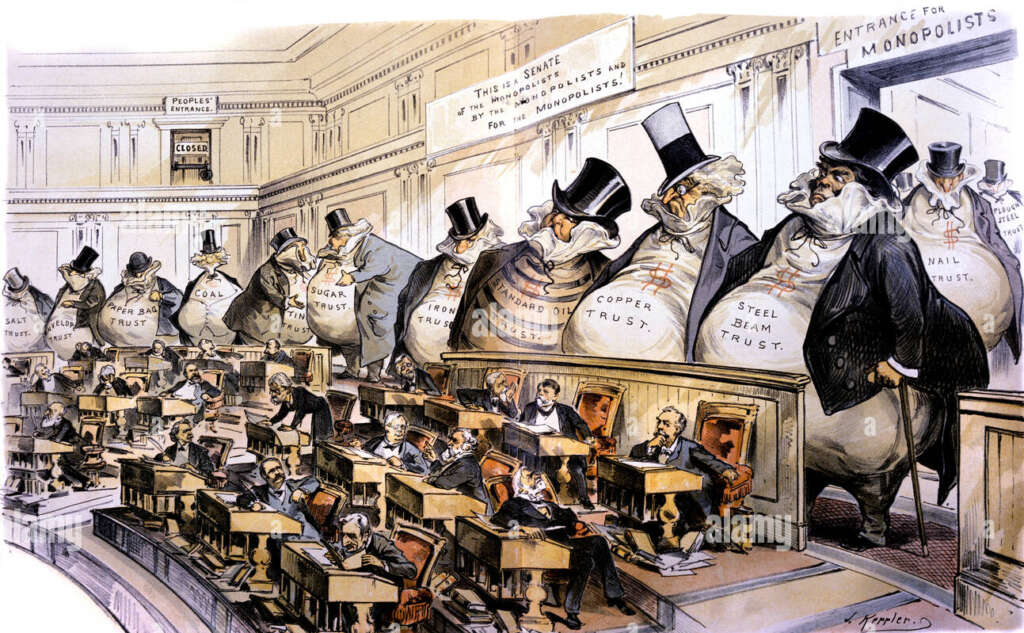As we delve into the annals of American history, we find numerous legislations that have significantly influenced the country’s socioeconomic landscape. The Sherman Antitrust Act is one such law that has played a crucial role in shaping the American business environment. This article aims to decode the Sherman Antitrust Act, a pivotal piece of legislation in American history, and its implications for the United States’ economy and society.

Table of Contents
How The Sherman Antitrust Act Came About
In the late 19th century, the American economy was dominated by large businesses that held immense power. Industrial giants were forming monopolies, driving away competition, and resorting to price fixing and cartels. This unchecked growth of big businesses led to the enactment of the Sherman Antitrust Act in 1890. This federal law was named after Ohio Senator John Sherman, who was an expert in the regulation of commerce.
The Sherman Antitrust Act was designed to curb the monopolistic fervor that was rampant in American business. The act comprised two key provisions – one that outlawed any combination that restricted interstate commerce or trade with foreign nations, and the second that prohibited attempts to monopolize any part of the commerce among the states or with foreign nations.
The Sherman Antitrust Act was the first federal law that placed limitations on concentrations of power perceived as harmful to trade and competition. It marked a significant shift in the government’s attitude towards business regulation and was a historic step towards curbing corporate power.
A Struggle for Implementation
The Sherman Antitrust Act initially proved ineffective in curbing industrial monopolies. The courts at the time held a narrow view of what constituted “trade or commerce among states,” which resulted in most companies escaping liability under the act. In fact, in its early years, the organizations most frequently prosecuted under the Sherman Act were not corporations but trade unions.
Despite these initial setbacks, the Sherman Antitrust Act played a crucial role in laying the foundation for stricter government regulations of big businesses. The enforcement of the Sherman Antitrust Act against corporations began to strengthen during the administration of President Theodore Roosevelt (1901-1909), known for his “trust-busting” actions. Later, during the Woodrow Wilson years, the Sherman Act was further strengthened with the passage of related legislation, such as the Clayton Antitrust Act and the formation of the Federal Trade Commission.
The “Rule of Reason” Interpretation and Its Reversal
An important development in the implementation of the Sherman Antitrust Act came about in 1920 when the U.S. Supreme Court applied the “rule of reason” interpretation to the Act. This interpretation specified that only “unreasonable” restraint of trade was unlawful, thereby allowing large firms more leeway. However, this interpretation was reversed in 1945, leading to a renewed enforcement of the prohibition of monopolies. This renewed enforcement included the breakup of significant corporations, such as the American Telephone and Telegraph Company in 1984.
Further Developments: Impact on Modern Business Practices
The Sherman Antitrust Act continues to influence modern business practices. Notable instances include the 1999 case against Microsoft Corporation for attempting to create a monopoly position in Internet browser software and the 2019 class action lawsuit against Apple Inc. for alleged violations of antitrust law.
The Sherman Antitrust Act APUSH EXAM
The Sherman Antitrust Act holds significance in the Advanced Placement United States History (APUSH) exam. The Act serves as a focal point for questions assessing students’ understanding of the reasons for and impacts of this legislation. Here’s an example question:
“Which of the following statements accurately describes the Sherman Antitrust Act of 1890?”
A) It was immediately effective as a check on monopolistic business practices. B) It was originally intended to apply only to trade unions. C) It was only applicable to businesses that engaged in intrastate commerce.
D) It was an important early step towards greater government regulation of business.
The correct answer is (D). The Sherman Antitrust Act was not strongly enforced for at least a decade after its passage; however, it did lay an important foundation for government regulation of business. It was the first step in giving the government the power to check the power of big businesses and break up trusts that were harmful to competition.
Some more commonly asked questions about the Sherman Antitrust Act APUSH
What was the purpose of the Sherman Antitrust Act?
The Sherman Antitrust Act was enacted to prevent the formation of monopolies and promote fair competition in the American business landscape. It outlawed any combination or conspiracy that restricted interstate commerce or trade with foreign nations and prohibited attempts to monopolize any part of trade or commerce.
What was the purpose of the Sherman Antitrust Act quizlet?
On Quizlet, the purpose of the Sherman Antitrust Act is described as a law enacted to curb concentrations of power that interfered with trade and competition. It was the first federal law that placed limits on monopolies and trusts to promote a competitive business environment.
What is a true statement about the Sherman Antitrust Act of 1890?
A true statement about the Sherman Antitrust Act of 1890 is that it was the first federal law enacted to curb the power of monopolies and promote fair competition in the American economy.
Which of the following statements describes the Sherman Antitrust Act?
The Sherman Antitrust Act can be described as a landmark legislation that aimed to prevent the formation of monopolies and promote fair competition. It outlawed any combination that restricted interstate commerce or trade with foreign nations and prohibited any attempt to monopolize any part of trade or commerce.
What was the Sherman Antitrust Act of 1890 in a sentence?
The Sherman Antitrust Act of 1890 was a federal law enacted to prevent the formation of monopolies, promote fair competition, and regulate interstate commerce and trade with foreign nations.
In conclusion, the Sherman Antitrust Act was a landmark legislation that laid the foundation for government regulation of big businesses in the United States. Despite its initial shortcomings, the Act played a crucial role in shaping the American business environment and continues to influence modern business practices.


